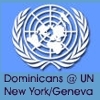

| BRIEFING - February 9 , 2011 | To learn more about the Millenium Development Goals click on the graphic
| |
The role of civil society in eradicating poverty In my last briefing, I offered an overview of the Commission for Social Development, which will be meeting from February 9–18 here in New York. The priority theme for the next two years is poverty eradication. This year provides an opportunity to evaluate progress made in this area, while 2012 will focus on policy recommendations. In this briefing I would like to focus on the role of civil society (non-governmental organizations) during the lead-up to the proceedings of the Commission, and beyond. As I mentioned last time, the NGO community is mobilized around the issue of poverty eradication, since many of our members live and work in some of the most impoverished parts of the world. Through our various networks throughout the world, NGOs try to glean the reality “on the ground,” and ask for input from people who are living in poverty, as well as those who are living and working with and for them. Our belief is that people living in poverty are not to be regarded as “part of the problem;” but rather, as “part of the solution.” Their participation in creating responses is absolutely essential. Besides working with our networks around the world, the NGOs visit the Member States’ Missions to the United Nations here in Manhattan. Our purpose is two-fold: first, to acknowledge and support efforts that are being made to eradicate poverty within countries; and secondly, to gently, yet firmly question why efforts are lagging, or non-existent in some countries. To prepare ourselves for these visits and our advocacy work with the Missions, we read the various documents that have been prepared for the Commission. “Poverty Eradication” and “New Partnership for Africa’s Development” are noteworthy. Another document that we have found particularly helpful is that written by the UN independent expert, Magdalena Sepulveda Carmona, on the question of human rights and extreme poverty. We then try to articulate what we, as members of civil society, representing our respective non-governmental organizations, believe to be essential in any discussions around the priority theme. We do this in two ways : through the composition of a Civil Society Declaration, which is submitted as a document to the Commission itself; and by preparing advocacy talking points which help to focus our conversations with government representatives. In our talking points, we remind the Member States what they have already committed themselves to in the UN Charter; namely, to “reaffirm faith in fundamental human rights, in the dignity and worth of the human person; and to promote social progress and better standards of life…”. However, despite these wonderful sentiments, the eradication of poverty has proven to be an elusive goal. The NGO community believes that the failure to situate the conversation within a human rights framework, contributes to this impasse. In our Civil Society Declaration, we state clearly that “Poverty is not an inevitable phenomenon. It is frequently a result of actions and omissions by those in charge of State policies and other powerful economic entities. Due to structural – often unaddressed – social, political, economic and cultural inequalities, it is transmitted from one generation to another.” Among the structural issues that continue to perpetuate the vicious cycle of extreme poverty we witness in the world today, we cite these three:
These unaddressed structural issues have a devastating effect on people living in poverty, violating a host of their basic human rights, among them, the right to food, water, housing, health care, education, as well as their right to participate as positive agents of change in society. Though the Commission concludes its formal session on Feb. 18, the advocacy work of NGOs with the Missions of the Member States will continue through the year, with a view toward influencing policy regarding poverty eradication during the 2012 session. On another note… At the end of January, I welcomed our Dominican Sister Jacqui Ryan (New Zealand), to the UN/NGO office here in New York. Jacqui will be working along with me as a volunteer until May. She will be attending sessions of the Commission for Social Development, as well as the Commission on the Status of Women (Feb. 20–March 4), and will be sharing her experiences in subsequent briefings. It is wonderful for me to have Jacqui here, as it is a reminder that this ministry is ours as Dominican family. I trust that the experience will be a good one for her, as well!
|
Dominican Leadership Conference
Building relationships and collaborating in the mission of preaching the Gospel
29000 West Eleven Mile Road
Farmington Hills MI 48336
248-536-3234 Contact: Executive Director
